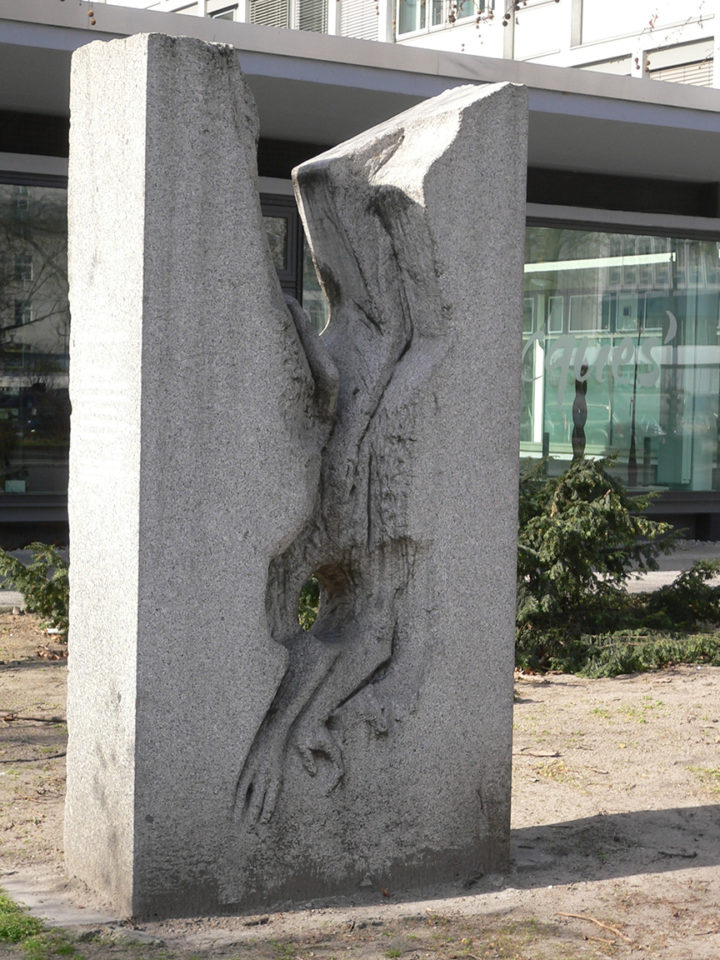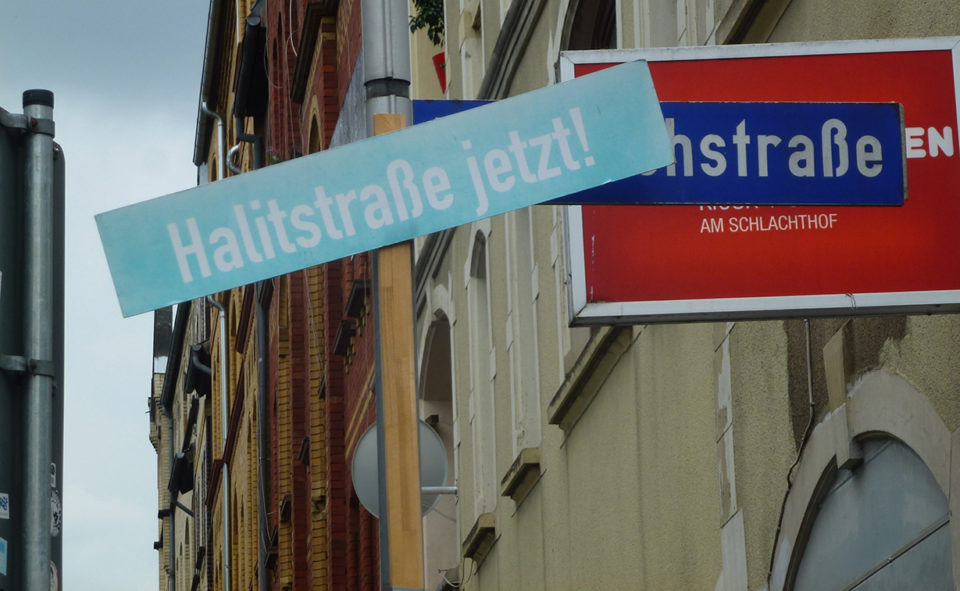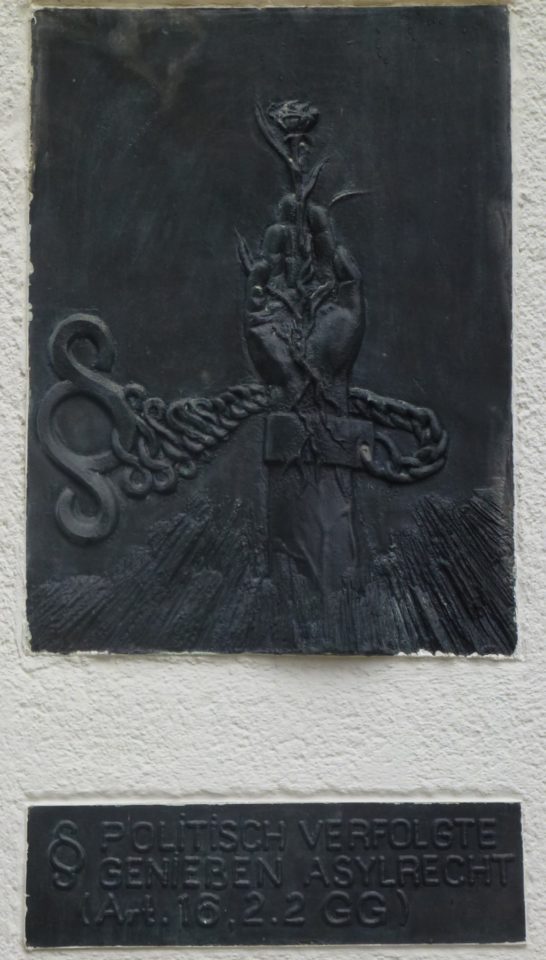Since May, the square in front of the slaughterhouse is 1988 unofficially Kemal-Altun-Platz. Who was Kemal Altun? What he stands? What led to the unofficial designation of the square?
On Guest contribution by Louis Lerouge

Kemal Altun Platz in the north of Kassel
The renaming of streets and squares, a dispute over the symbolic order and culture of memory within the urban space. is known in Kassel the current demand for the renaming of the Dutch street in Halitstraße (Halit Yozgat, 9. and last victims of NSU). Thus a demand there was, however, already in Kassel and that after the (A-)Naming of a street or square after Kemal Altun. Since May, the square in front of the slaughterhouse is 1988 unofficially Kemal-Altun-Platz, in Hamburg in the district Ottensen there is a by the state unrecognized Kemal-Altun-Platz, both can be found on Google maps. Who was Kemal Altun? What he stands? What led to the unofficial designation of the square?
Who was Kemal Altun?
the 13. April 1960 in Engiz near Samsun (Turkey) born Kemal Altun was a Turkish asylum seekers in the Federal Republic of Germany. He committed the 30. August 1983 in the context of his impending extradition to the Turkish military dictatorship suicide, by jumping from the sixth floor of the West Berlin Administrative Court. Here, you could leave it, but a closer look is worth its history.
Kemal Altun came from a Republican in the Social Democratic People's Party (CHP) organized families, and was himself politically active even as a schoolboy and student. After the military coup on 12. September 1980 were numerous dissidents inside *, also Altuns next district, arrested, tortured or murdered. Am 8. November 1980 the 20-year-old Kemal Altun flew from Istanbul to Romania, since it * inside was not any visa requirement for citizens of Turkey. After a few days he went to Bulgaria, wo er 20 days lived. From there it his brother Ahmet Altun brought his private car to Romania, Hungary, in Czechoslovakia and East Germany to West Berlin to his sister living there Sultan. As Kemal Altun few months later was told by Turkish newspapers it, that the Turkish authorities his involvement in the assassination of 2. Chairman of the fascist MHP and former customs- and Trade Minister Gün Sazak imputed, He claimed on 7. September 1981 political asylum.
“Am 21. February 1983 the federal government approved the extradition of Kemal Altuns to Turkey, whose military dictatorship to it by Amnesty International of "death by inhuman prison conditions, Torture or execution "threatened.”
Even before the application for asylum the responsible Federal Office for the recognition of foreign Refugees had been processed, told the State Security Division the police chief in Berlin by his request and turned the BKA in Wiesbaden a. The BKA forwarded the contents of the asylum application in May 1982 Interpol Ankara continues - linked to the question, if an extradition application is made. presented on the same day the Turkish government issued an arrest warrant and the 18. May met their answer to the German authorities a: is "The person due to the mentioned in your messages crime in our Country looking for ... "Instead of asylum had for Altun revelation its prosecution history beginning with the 5. July 1982 the Extradition result. Am 21. February 1983 approved the Federal government the extradition to Turkey Kemal Altuns, in whose military dictatorship to it by Amnesty International of "death by inhumane conditions, Torture or execution " threatened.

Memorial to Kemal Altun in Berlin Charlottenburg
In March 1983, to 13 months under severe conditions in the Moabit prison, he was taken from its cell and delivery intent into a cell laid in police custody in West Berlin Gothaer Straße. Meanwhile was a broad solidarity movement in Germany and Europe emerged. Against extradition turned a European wave of protests, Statements and interventions, on which MPs from Switzerland, Denmark and England, the President of Raiffeisen Bank, amnesty international, humanistic Organizations, the commissariat of the bishops, the height UN Commissioner for Refugees, several bar associations as well as the Council of Europe involved. The deportation was also due to an am 2. May 1983 by one by the European Commission for Human rights in Strasbourg legal complaint against the Delivery held up initially. But the will of Federal government, Kemal Altun to the Turkish military dictatorship to deliver, remained unbroken.
Am 6. June 1983 becomes Kemal Altun recognized as a person entitled to asylum, nevertheless he has to remain in detention stay. The Federal Commissioner for Asylum Matters raises against the recognition decision of the Federal Office before the action Administrative court in West Berlin. The procedure to clarify the question, whether Altun will be extradited to the Turkish military government could, found from 25. August on the sixth floor of the Higher Administrative Court of Berlin. The second day of the trial ran Altun, after the handcuffs were opened, to an open one Window in the courtroom closed, crashed 25 Meters down and died.
What does Kemal Altun stand for?
In contradiction to that, that Government politicians dealing with Kemal Altun as an "individual case" designated, Well over a hundred comparable cases followed. The Turkish authorities also constructed similar allegations against other Turkish citizens, those in the Federal Republic of Germany lived. Since September 1980 went over 150 Extradition request. The End 1983 checked the Federal Republic still about 40 Percent of these cases, at 20 Percent she was that Request already complied with at this point in time and had the Surrendered directly into the hands of their torturers. This policy was supported by questionable decisions Federal German courts, such as. from the Administrative Court Baden-Württemberg from 27. May 1982: “Rather, torture is in Turkey a general phenomenon, not only of that left-wing Kurds are affected. […] Torture and Mistreatment of persons, that of a political offense are more common and more severe than those of other suspects. Here, however, with regard to the state motivation should not be seen as a political component. In addition, the phenomenon is likely, that torture and Abuse relatively strong, especially in the run-up to the political Are common in criminal law, not least also on Have forensic peculiarities traced back. […] With political persecution this has nothing to do with ... " (InfAus1R 1982, 255).
“On the second day of the trial, Altun ran, after the handcuffs were opened, towards an open window in the courtroom, crashed 25 Meters down and died.”
The "case" is Kemal Altun rather typical for West German politics in Turkey. The special ones Relationships ”are determined by the following political premises:
- Return as many migrant workers and their families as possible
- As a necessary condition of this policy: the prevention of further immigration
- Support for Turkey in military and security-related areas to stabilize NATO's south-east flank.
Racists sprayed "Turks out" on the walls at that time and the NPD did thus election campaigns. The demand “Turks out” was one of the first above 35 Years also to the political plans of the CDU and CSU and they met with broad approval from the population. Under other with the promise, the number of foreigners Drastically reduce Germany, Helmut Kohl had it Bundestag election on 6. March 1983 won. “About the next four Years it will be necessary, the number of Turks around 50 Percent to to reduce", so it was for Kohl four weeks after his election to then British Prime Minister Margaret Thatcher revealed. The black-yellow coalition passed 1983 a corresponding "Law for the temporary promotion of the willingness of foreigners to return ". 10.500 DM (knapp 5.400 EUR) was offered to the Turks as parting money and payment of their pension insurance contributions, if you are in your To withdraw "home". Of the approx. 1,5 Millions in the Turks living in the Federal Republic of Germany took about 100.000 the offer at.

How did the unofficial Naming of the place?
In year 1985 it came in Kassel at the municipal level on red-green coalition negotiations, in which was agreed, a street or a square in Kassel to Kemal Name Altun. This requires the approval of the local councils, which did not exist, however. There was no local council for one (A-) designation.
So it was on the International Spring Festival in May 1988 in the presence of the brother from Kemal Altun, renamed the place without municipal approval and the street sign inaugurated. On the same day the Side wall of the slaughterhouse building a relief of the Turkish Sculptor Eyüp Öz - who was also present - attached, that refers to Altun's fate. It shows a hand, in the Chains and holds a rose. Together with the one below affixed inscription “Politically persecuted people enjoy the right of asylum (Art. 16.2.2 GG)“It should and should still be sent to them today remember the hopeless situation of deportation detainees. A There has not yet been an official naming of the place, so it is is not an official street name.

Memorial plaque in Kassel
